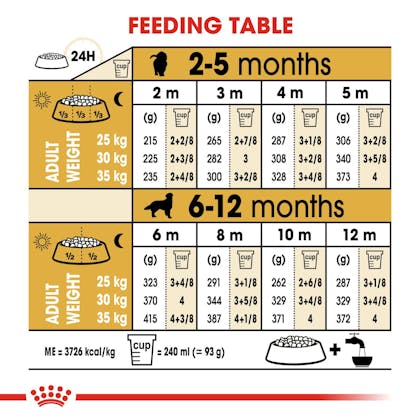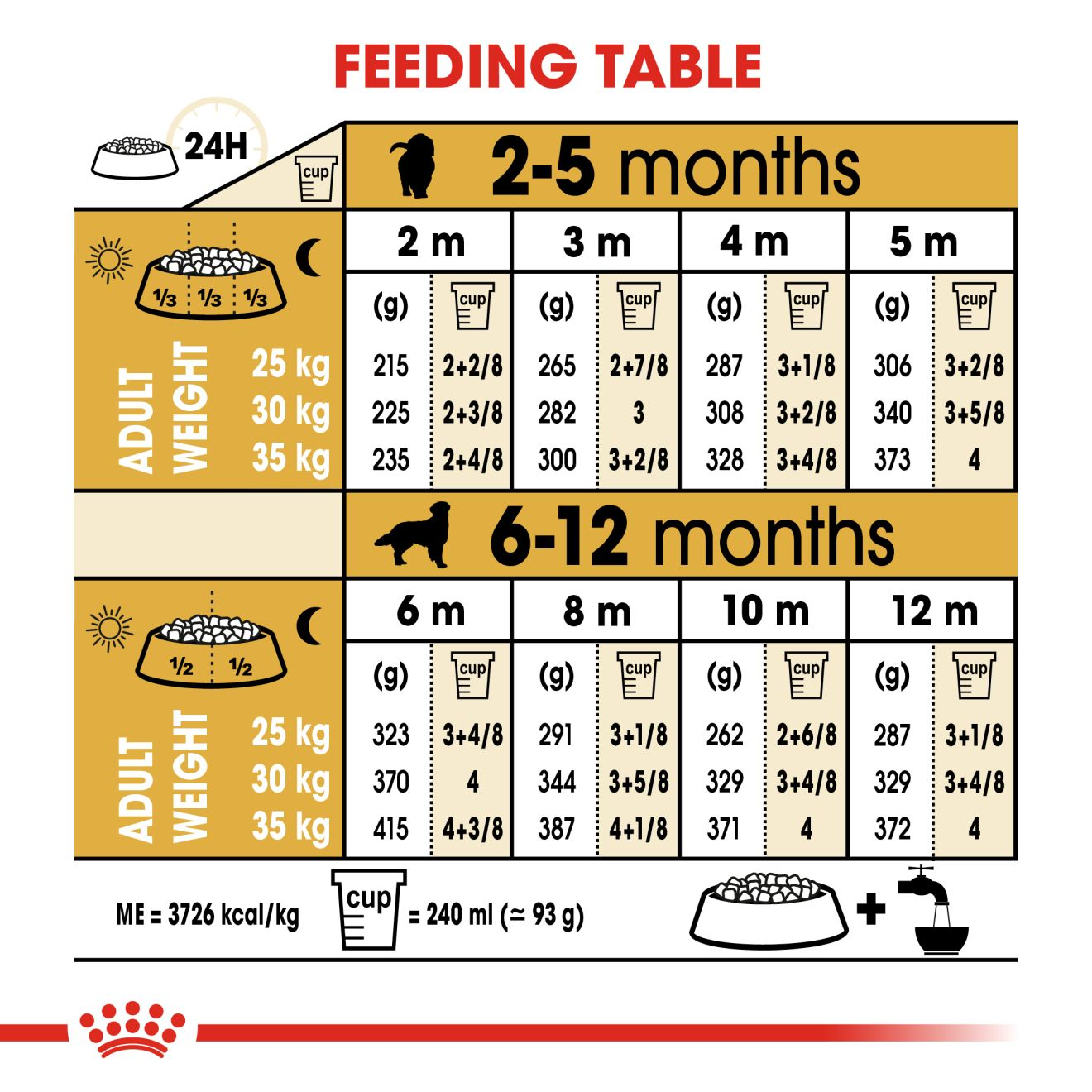Ready to dive into the world of golden retriever puppies and their feeding needs? Well, you’ve come to the right place! Today, we’re going to answer the burning question, “How much to feed a golden retriever puppy by age?”
Feeding your furry friend appropriately is crucial for their growth and overall health. And as your golden retriever pup grows, their nutritional requirements change. It’s like leveling up in a video game, but with kibbles instead!
So, whether you’re a proud new puppy parent or just curious about these adorable furballs, let’s explore how to keep those wagging tails happy and full at every stage of their development.
Feeding a golden retriever puppy based on their age is important for their growth and development. As a general guideline, start by feeding them small, frequent meals and gradually increase the portion size as they grow. Consult with your veterinarian for personalized advice, but on average, a golden retriever puppy needs about 1 to 1.5 cups of food per day, split into 3-4 meals. Adjust their portion size as needed to maintain a healthy weight.
How to Feed a Golden Retriever Puppy: A Complete Guide
Golden retriever puppies are known for their playful and energetic nature. As a responsible dog owner, it’s crucial to provide them with the right nutrition to support their growth and development. In this comprehensive guide, we will discuss how much to feed a golden retriever puppy by age, ensuring they get the nutrition they need at each stage of their life. Whether you’re a first-time puppy owner or looking for tips to optimize your golden retriever’s diet, this article has got you covered.
Feeding a Golden Retriever Puppy: The Basics
When it comes to feeding a golden retriever puppy, it’s important to strike a balance between meeting their nutritional needs and preventing overfeeding. Overfeeding can lead to obesity, which can have detrimental effects on their overall health. On the other hand, underfeeding can result in malnutrition and stunted growth. Let’s dive into the specifics of how much to feed a golden retriever puppy by age, taking into consideration their unique dietary requirements at different stages of their development.
Feeding a Golden Retriever Puppy: 6-8 Weeks Old
During the first few weeks after birth, golden retriever puppies rely entirely on their mother’s milk for nourishment. However, as they reach 6-8 weeks of age, it’s time to start introducing solid food. At this stage, you should begin the weaning process by offering them small amounts of a high-quality puppy food that is specially formulated for their needs. Softening the food with warm water can make it easier for them to chew and digest. Start with 3-4 small meals per day and gradually increase the serving size as their appetite grows.
It’s essential to consult with your veterinarian to determine the appropriate serving size based on your specific puppy’s needs. The feeding guidelines on the puppy food packaging can be used as a starting point, but individual variations may require adjustments. Keep in mind that portion sizes should be small to avoid overwhelming their developing digestive system.
Additionally, provide a shallow dish of fresh water alongside their meals to keep them hydrated. Monitor their eating habits and adjust the feeding schedule accordingly, ensuring they don’t overeat or leave food uneaten for long periods.
Feeding a Golden Retriever Puppy: 2-4 Months Old
As golden retriever puppies grow older, their nutritional needs evolve. From 2 to 4 months of age, they experience a rapid growth spurt and require increased calorie intake to support their developing muscles and bones. During this stage, it’s recommended to feed them three meals a day, gradually transitioning from puppy food to a balanced diet formulated for all life stages.
The portion sizes should be larger now compared to the previous stage, but always keep an eye on your puppy’s body condition to ensure they’re not becoming overweight. A veterinarian can help you determine the appropriate serving size based on your puppy’s weight, activity levels, and overall health.
This is also a good time to introduce nutritional supplements, such as omega-3 fatty acids, to support their brain development and promote a healthy coat. Your veterinarian may recommend specific supplements that are safe and beneficial for golden retriever puppies.
Feeding a Golden Retriever Puppy: 4-6 Months Old
By the time golden retriever puppies reach 4 to 6 months of age, they have likely completed the weaning process and are fully adapted to solid food. At this stage, you can reduce the frequency of feeding from three meals to two meals per day. However, the total daily caloric intake should remain the same. Consult your veterinarian to determine the appropriate portion sizes to maintain a healthy weight for your puppy.
Monitor your puppy’s body condition and adjust their diet accordingly. If you notice that they are gaining too much weight, it may be necessary to reduce their portion sizes slightly. On the other hand, if they appear underweight or excessively active, increasing the amount of food may be necessary. Remember, every puppy is unique, and their nutritional needs may vary.
Continue providing a balanced diet that includes high-quality proteins, whole grains, fruits, and vegetables. Avoid feeding table scraps or foods that are harmful to dogs, such as chocolate and onions. Fresh water should always be available to keep your puppy hydrated throughout the day.
Feeding a Golden Retriever Puppy: 6-12 Months Old and Beyond
As golden retriever puppies approach their first birthday, they are considered to be transitioning into adulthood. During this period, their growth rate slows down, but their nutritional needs continue to evolve. At around 6 to 12 months of age, you can generally switch from puppy food to an adult dog food formula.
When transitioning to adult dog food, it’s important to do so gradually to prevent digestive upset. Start by mixing a small amount of the new food with their existing puppy food and gradually increase the proportion of the new food over a span of 7-10 days. This will allow their digestive system to adjust smoothly to the change.
Once your golden retriever puppy has fully transitioned to adult dog food, feeding should be reduced to two meals per day. Continue monitoring their body condition and adjust the portion sizes as needed. Some adult dog food formulas offer specific variants for large breed dogs, which may be beneficial for golden retrievers due to their size.
Conclusion:
Feeding a golden retriever puppy is a crucial aspect of their overall care. By following the appropriate feeding guidelines for each age stage, you can ensure that your furry friend receives the necessary nutrition for optimal growth and development. Remember to consult with your veterinarian for personalized advice based on your puppy’s unique needs. Providing a well-balanced diet, monitoring their body condition, and making necessary adjustments along the way will help your golden retriever puppy grow into a healthy and happy adult dog.
Key Takeaways: How Much to Feed a Golden Retriever Puppy by Age
- Feed your golden retriever puppy 3-4 meals a day until they are 6 months old.
- From 6 months to 1 year, reduce their meals to 2-3 times a day.
- After 1 year, feed them 1-2 meals a day.
- Each meal should consist of high-quality puppy food.
- Consult your veterinarian to determine the appropriate amount of food based on your puppy’s individual needs.
## Frequently Asked Questions
Golden retriever puppies have specific nutritional needs that change as they grow. Here are some frequently asked questions about how much to feed a golden retriever puppy by age:
1. How often should I feed my golden retriever puppy?
Golden retriever puppies should be fed three to four times a day, especially during their first few months. As they grow older, you can gradually reduce the frequency to two meals per day. Establishing a regular feeding schedule will help maintain their digestive system and provide them with consistent energy throughout the day.
It’s important to note that portion sizes may vary depending on the individual dog’s age, activity level, and overall health. Consulting with a veterinarian is recommended to determine the appropriate amount to feed your golden retriever puppy.
2. How much should I feed my golden retriever puppy at each meal?
The quantity of food your golden retriever puppy needs depends on its age and size. Generally, a puppy should consume about a cup of high-quality puppy food at each meal. However, this can vary, so it’s best to consult with your veterinarian for specific feeding recommendations.
It’s important to avoid overfeeding your golden retriever puppy, as excess weight gain can lead to health issues like joint problems and obesity. Monitoring their body condition and adjusting their food intake accordingly is crucial for their overall well-being.
3. What should I feed my golden retriever puppy at different ages?
During the first few weeks of life, a golden retriever puppy will rely on its mother’s milk for nutrition. However, once they are around four to five weeks old, you can introduce them to puppy food that is soft and easily digestible. Look for a high-quality puppy food that is specially formulated for their needs.
As your golden retriever puppy grows, you can gradually transition them to dry kibble. Make sure to choose a brand that meets the nutritional requirements for puppies and consult with your veterinarian for specific recommendations. Avoid giving them human food, as it may not provide the necessary nutrients and can lead to digestive issues.
4. Can I give treats to my golden retriever puppy?
Treats can be a great way to reward your golden retriever puppy for good behavior and training. However, it’s important to choose treats specifically made for puppies and in moderation. Treats should not exceed 10% of their daily caloric intake to ensure they still receive balanced nutrition from their regular meals.
Overfeeding treats or giving them inappropriate foods can lead to weight gain and potential health problems. Always read the labels and choose treats that are appropriate for their age and size. You can also consult with your veterinarian for recommendations on healthy and suitable treats for your golden retriever puppy.
5. Should I make any dietary adjustments as my golden retriever puppy gets older?
As your golden retriever puppy grows into an adult, their nutritional needs will change. It’s essential to transition them from puppy food to adult dog food around one year of age. Adult dog food has different nutrient levels that cater to their mature needs.
When transitioning their diet, do it gradually over the course of a week to avoid any digestive issues. Mix a small amount of the new adult dog food with their puppy food and gradually increase the proportion of adult dog food. Monitor their weight and overall health during this transition and consult with your veterinarian if you have any concerns.
Summary
Feeding a Golden Retriever puppy the right amount of food is essential for their growth and health. When they are young, give them small, frequent meals to support their rapid development. As they grow, gradually increase the portion sizes and reduce the frequency of feedings. Use a high-quality puppy food that meets their nutritional needs. Keep an eye on their weight and adjust their portion sizes accordingly. It’s important to consult with your veterinarian for specific feeding guidelines based on your puppy’s age and activity level. Remember, a healthy and balanced diet is key to raising a happy and thriving Golden Retriever puppy.
In addition to proper feeding, providing fresh water at all times is crucial for their well-being. Avoid feeding them human food as it can be harmful. Implement a consistent feeding schedule and avoid overfeeding to prevent obesity. By following these guidelines and seeking veterinary advice, you can ensure that your Golden Retriever puppy grows up to be a healthy and happy companion for years to come.

